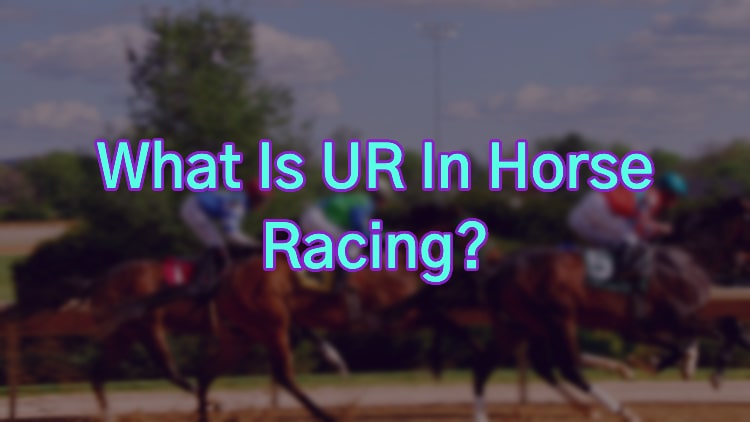
If you're new to horse racing, you might have come across abbreviations like "UR" and wondered what they mean. Horse racing has its own set of terms and lingo which can sometimes be confusing.
UR stands for "Unseated Rider". This happens if the jockey falls off the horse during the race. It's important to know what these terms mean to better understand the race results and statistics.
In this blog post at Mega Reel Casino, we'll explain what UR means, how it can happen, and what it means for the race and the horse involved. So, let's dive in and help you become more familiar with this piece of horse racing terminology.
What Does UR Mean In Horse Racing?
In horse racing, UR stands for "Unseated Rider". This happens when the jockey accidentally falls off the horse during a race. When a UR occurs, it means that the horse is running without its jockey.
UR can occur for various reasons. Sometimes, the horse may get spooked or stumble, causing the jockey to lose their balance. Other times, there may be a collision with another horse, leading to an unseated rider.
When a UR happens, the horse is no longer in contention for winning the race. Even if the horse finishes first without the jockey, it won't be counted as a valid result.
Understanding terms like UR can help you better comprehend race results. It ensures you know why a particular outcome occurred, and it can help you make more informed decisions if you are placing bets. Always remember to gamble responsibly, keeping in mind that outcomes can be unpredictable.
With this understanding, you'll be better equipped to follow along with horse racing events and understand the race outcomes when you see terms like UR in the results.
Do You Get Money Back For Unseated Rider?
Whether you get your money back for an unseated rider (UR) depends on the bookmaker's rules and the type of bet you placed. It's important to always check the terms and conditions before placing any bets.
Some bookmakers offer "Fallers Insurance" or similar promotions, where you might get a refund or a free bet if your horse unseats its rider. In these cases, you could get your stake back, providing some protection against this unpredictable event.
However, standard bets usually do not offer refunds for unseated riders. If your jockey is unseated and you're not covered by any insurance or promotion, your stake is generally lost.
Always read the fine print and understand the specific rules of the bookmaker you are using. This can help you make better decisions and manage your betting more effectively.
Remember, it's crucial to gamble responsibly. Keep in mind that horse racing can be unpredictable and outcomes are never guaranteed.
Can a Horse Win Without a Jockey?
A horse cannot win a race without a jockey. For a horse to be considered a valid participant and possible winner, it must have a jockey on its back throughout the entire race.
When a jockey is unseated, the horse might continue running and even cross the finish line ahead of the others. However, since the rules require the jockey to stay mounted, the horse is disqualified from winning.
Without a jockey, the horse doesn't have the necessary guidance and control. The jockey helps the horse navigate the track, maintain speed, and avoid obstacles, making their role essential for a race.
It's always disappointing when a jockey is unseated, but these rules ensure fair competition for all participants. If you're betting, understanding these rules helps you manage expectations and make informed decisions.
Do Jockeys Fall Very Often?
Jockeys falling off their horses, also known as unseating, doesn't happen very often, but it's a recognised risk in horse racing. Horse racing is a high-speed sport with many variables, and jockeys are trained to handle various situations.
Falls can occur for several reasons. Sometimes, a horse might trip, stumble, or get spooked, causing the jockey to lose their balance. Other times, crowded track conditions can lead to accidental collisions, which might unseat a rider.
Jockeys are skilled professionals who undergo rigorous training to minimise the risk of falling. They learn how to balance, navigate the track, and handle different horses under various conditions.
Racecourses and organisers also prioritise safety, implementing measures to reduce the chances of such incidents. Despite these efforts, the nature of the sport means that falls can never be completely avoided.
Knowing this helps set realistic expectations when watching races or placing bets and underscores the importance of safety measures in the sport. Always remember to gamble responsibly, and deepening your understanding of the different terms involved is a great help in doing so.
